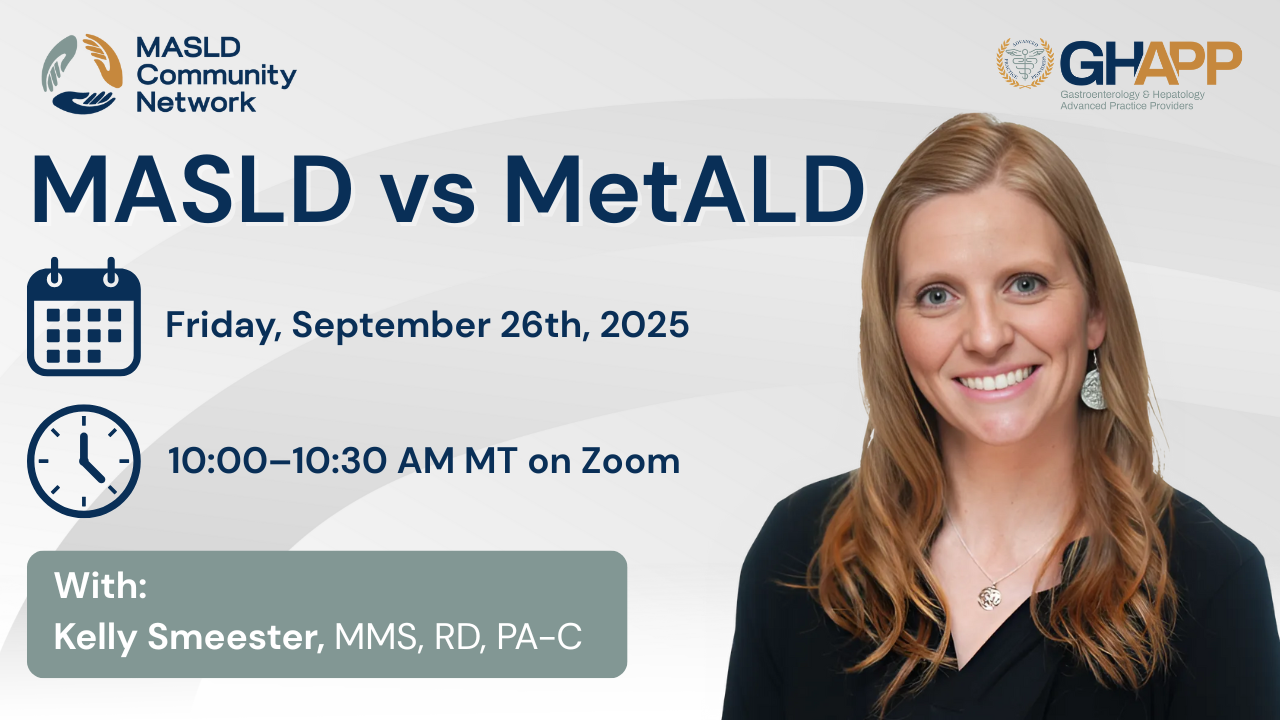
Kelly Smeester
MMS, RD, PA-C
Location : Denver, CO, USA
BIO
Kelly is a dedicated and compassionate physician assistant with nearly 15 years of experience in internal medicine, endocrinology and gastroenterology in both inpatient and outpatient settings.
She received her undergraduate degree in dietetics, graduating summa cum laude, from the University of Northern Colorado. Kelly then completed her dietetic internship at the University of Iowa Hospitals & Clinics. Over a five-year period, she worked as a clinical dietitian at several Denver-area hospitals. Kelly then earned her master’s degree in medical science at St. Francis University while also completing her physician assistant certificate.
For the past five years, she has worked at South Denver Gastroenterology and her role encompasses general gastroenterology, but she has special interest in metabolic disorders and is a steering committee member of MAPP (an APP driven educational organization focused on metabolic disease). Prior to joining South Denver GI, Kelly served as an internal medicine/hospitalist physician assistant and an endocrinology physician assistant. She finds that the metabolic disease space brings together the different aspects of her career.
When not working, she enjoys time in the beautiful Colorado outdoors, along with her husband and two children.
MASLD-MASH Content Featuring Kelly
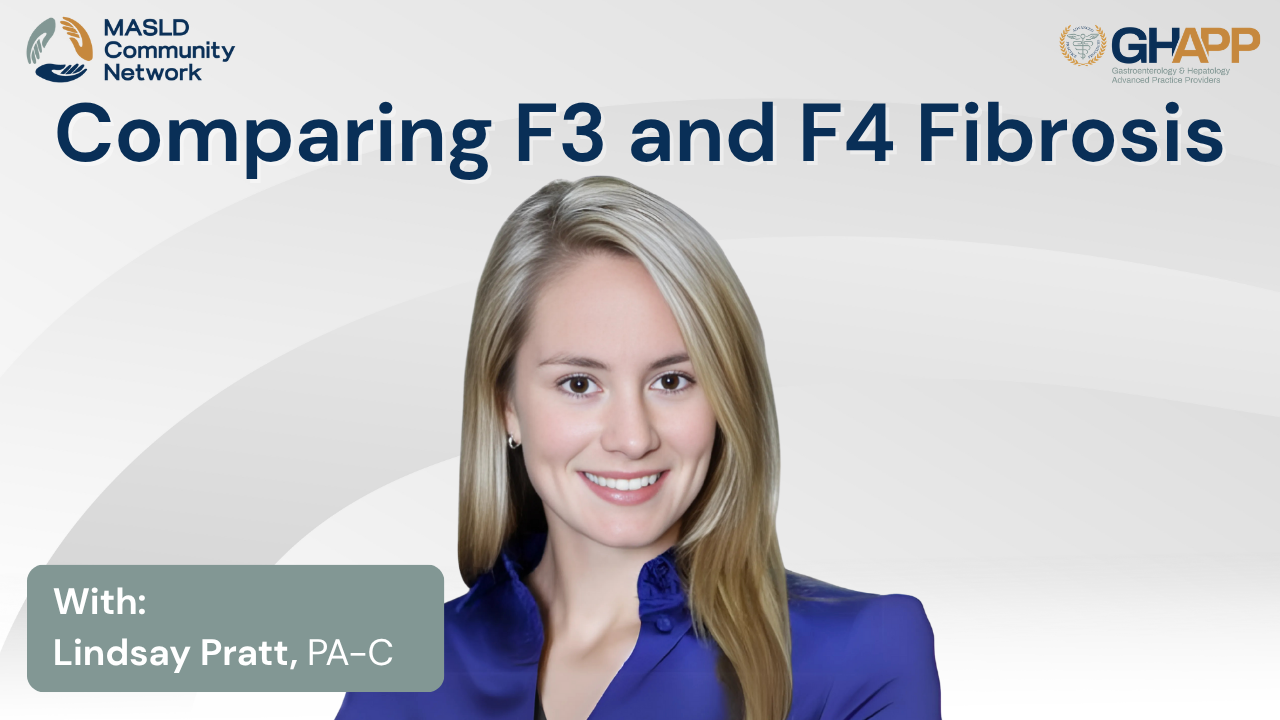
Comparing F3 and F4 Fibrosis With Lindsay Pratt

Join Lindsey Pratt, PA-C from the University of Colorado Liver Transplant Program, for an in-depth clinical comparison of F3 and F4 fibrosis in patients with MASLD (Metabolic Dysfunction–Associated Steatotic Liver Disease) and MASH (Metabolic Dysfunction–Associated Steatohepatitis). Using an identical patient profile with differing non-invasive testing results, Lindsey demonstrates how to accurately stage fibrosis using tools like FIB-4, FibroScan, CAP score, and ELF test—emphasizing when pharmacologic intervention is appropriate and when advanced monitoring becomes critical. This session explores the clinical implications of fibrosis staging, treatment pathways including resmetirom (Rezdiffra), the role of GLP-1 receptor agonists, and practical nutrition and lifestyle strategies. For F4 patients, Lindsey outlines key elements of surveillance for hepatocellular carcinoma (HCC), portal hypertension management, and transplant evaluation. Whether you're in hepatology or primary care, this case-based discussion offers evidence-backed guidance for managing patients across the MASLD/MASH spectrum and preventing liver disease progression.
Watch Now
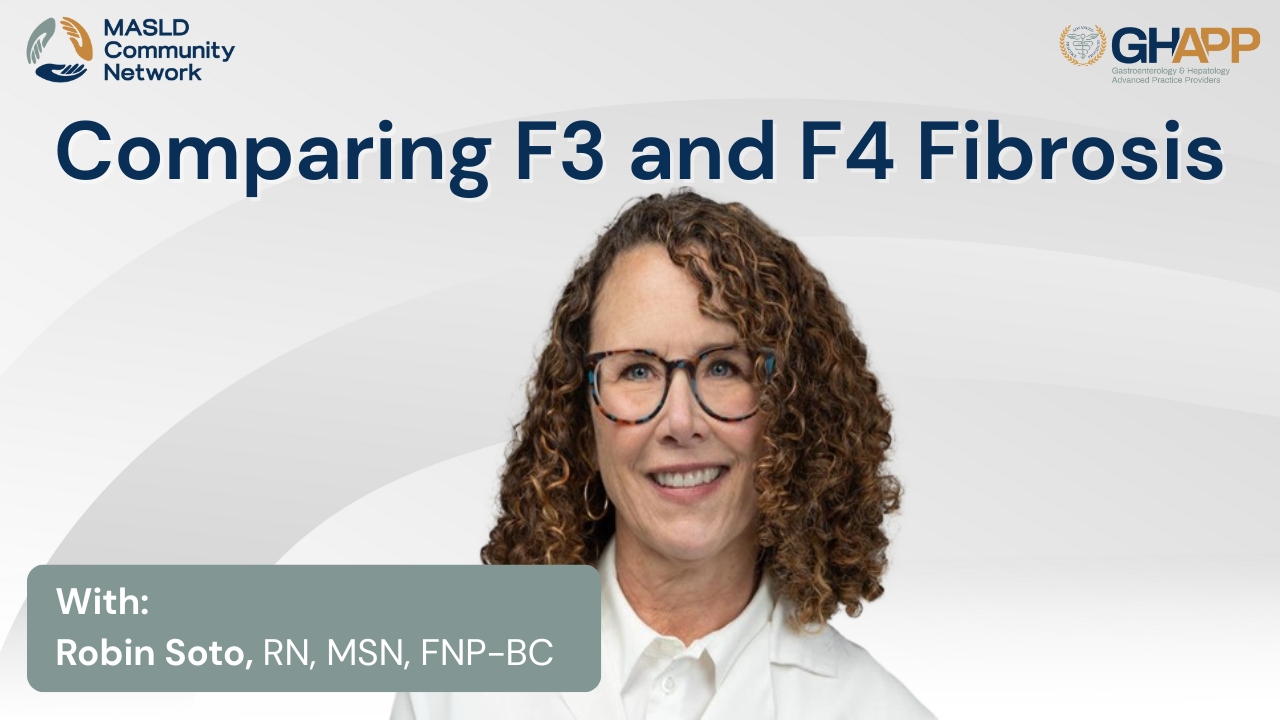
Comparing F3 and F4 Fibrosis With Robin Soto

In this in-depth case-based session from the GHAPP MASLD/MASH Community Network, Robin Soto, NP from UC San Diego Health, explores the clinical nuances of diagnosing and managing fibrosis stage 3 versus stage 4 in patients with MASH (Metabolic Dysfunction–Associated Steatohepatitis). Using a real-world case study of a patient named Sam, Robin demonstrates how to interpret and reconcile non-invasive tests (NITs) like FIB-4, FibroScan, CAP score, and ELF test to guide accurate staging. She offers practical insights into treatment decisions, including when to use resmetirom, the importance of lifestyle modification, and how to assess comorbidities like diabetes, obesity, and cardiovascular risk. The session also outlines when and how to monitor for hepatocellular carcinoma (HCC), implement liver cancer surveillance strategies, and approach multidisciplinary care for advanced fibrosis or cirrhosis. Whether you’re a hepatology specialist or a primary care provider, this video equips you with evidence-based tools for managing MASLD and optimizing outcomes in complex liver disease.
Watch Now
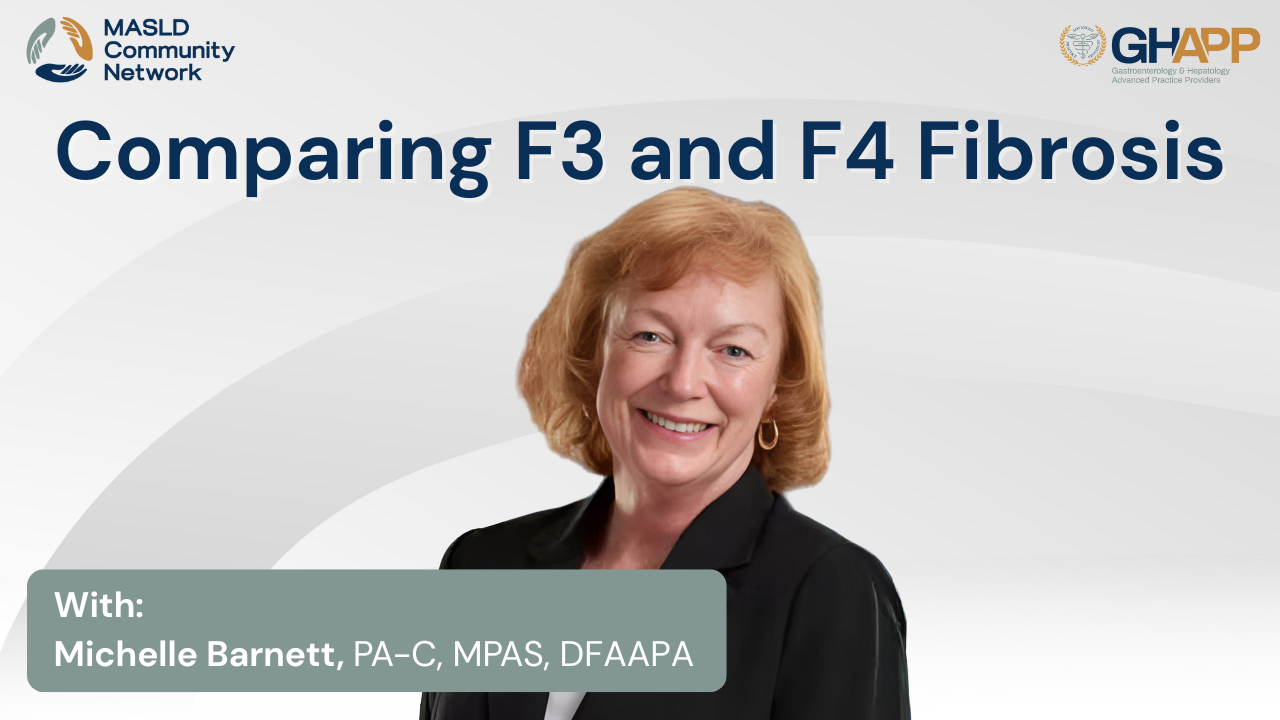
Comparing F3 and F4 Fibrosis With Michelle Barnett

In this installment of the GHAPP MASLD Community Network, Michelle Barnett, PA-C from Peak Gastroenterology in Colorado Springs, presents a deep dive into the clinical management of MASH—formerly known as NASH or non-alcoholic steatohepatitis. Through two comparative case studies, Michelle explores the nuances of diagnosing and managing patients with F3 and F4 fibrosis. Learn how to effectively use non-invasive diagnostic tools like FIB-4, FibroScan, and ELF testing, and gain valuable insights into stratifying fibrosis risk, monitoring hepatocellular carcinoma (HCC), and determining when resmetirom is appropriate. This session also covers practical guidance on nutrition, exercise, medication safety, and multidisciplinary care for patients with advanced liver disease. Whether you're a hepatology specialist or a primary care provider navigating the MASLD/MASH landscape, this video offers actionable strategies to improve long-term patient outcomes and reinforces the critical role of lifestyle intervention and liver disease surveillance.
Watch Now
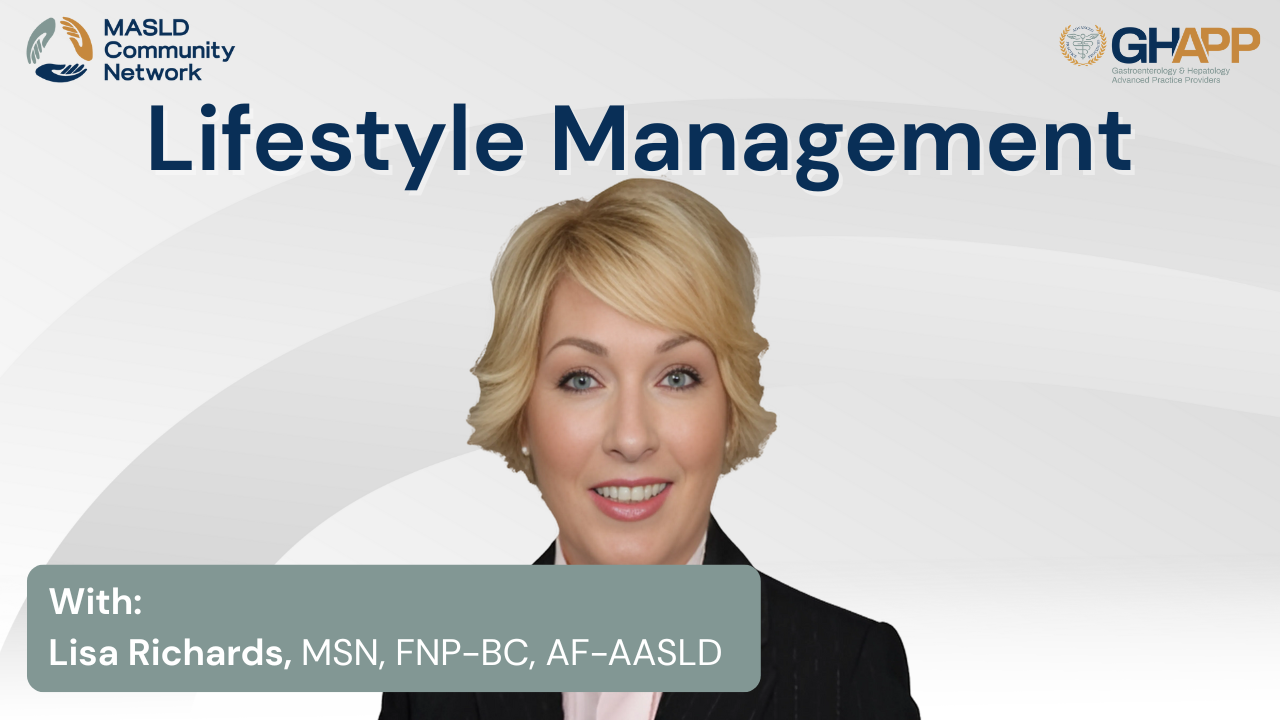
Lifestyle Management With Lisa Richards

Join Lisa Richards, FNP-BC, from UC San Diego Health, as she leads a powerful educational session on the lifestyle management of MASLD (Metabolic Dysfunction–Associated Steatotic Liver Disease) in this GHAPP MASLD/MASH Community Network event, sponsored by Madrigal Pharmaceuticals. Through a compelling clinical case study, Lisa walks viewers through a step-by-step approach to diagnosing MASLD, assessing fibrosis risk using noninvasive tools like FIB-4 and FibroScan, and implementing guideline-based interventions. Learn how to counsel patients on culturally sensitive dietary modifications, physical activity strategies, and behavior change techniques that improve outcomes. This session also explores the clinical relevance of weight loss thresholds, Mediterranean-style eating plans, and the importance of patient-centered goal setting. Whether you’re a provider managing metabolic liver disease or looking to integrate newer therapies like resmetirom, this video offers practical tools to empower sustainable change and improve liver health.
Watch Now

APP Insight: Misconceptions About Liver Health

In this video, Kelly Smeester, PA-C from South Denver Gastroenterology, addresses some of the most common and harmful misconceptions about liver health. One major myth she tackles is the belief that liver disease only affects those who drink excessive amounts of alcohol. Kelly explains that liver disease has many causes—including autoimmune conditions, viral infections, and metabolic dysfunction—meaning even individuals who don’t drink at all may still be at risk. She emphasizes the dangers of relying on unregulated “liver detox” supplements, clarifying that the liver is a natural detox organ and doesn’t require external cleanses, which may actually do more harm than good. Kelly also highlights how liver disease can be entirely asymptomatic, particularly in patients with conditions like type 2 diabetes, obesity, hypertension, and high cholesterol. Finally, she reinforces that cirrhosis is not solely alcohol-related and can result from steatotic liver disease, making regular liver evaluations and screenings crucial for early detection and management. This video is an essential resource for patients and providers aiming to better understand liver health beyond outdated myths.
Watch Now

Management of Life Style Modification

This video focuses on the comprehensive management of patients with metabolic-associated steatohepatitis (MASH), emphasizing lifestyle modifications, dietary adjustments, and exercise strategies. Key topics include the importance of addressing risk factors like diet, exercise habits, and alcohol intake, as well as referrals to medically supervised weight loss clinics or bariatric surgery for advanced cases. The speaker highlights the benefits of the Mediterranean diet, intermittent fasting, and avoiding ultra-processed foods while discussing the role of resistance training to combat sarcopenia and maintain muscle mass. Practical advice and tailored recommendations ensure a holistic approach to managing MASH and improving patient outcomes.
Watch Now

Third Step of Life Style Management

This video provides a comprehensive overview of emerging pharmacologic treatments for metabolic-associated steatohepatitis (MASH) and their tailored applications based on patient profiles. Topics include FDA-approved therapies, drugs in advanced clinical trials (such as semaglutide and lanifibranor), and the potential for combination treatments targeting both steatohepatitis and fibrosis. The speaker emphasizes the importance of patient-specific approaches considering metabolic profiles, obesity, and diabetes status, alongside lifestyle interventions. Additionally, the video discusses the evolving interdisciplinary care model and highlights the exciting progress in non-invasive testing and treatment advancements for F2-F3 fibrosis.
Watch Now

Approved Medication for MASH/NASH

This video provides detailed guidance on selecting and monitoring patients for emerging therapies targeting advanced fibrosis (F2-F3) in NASH. Key topics include contraindications for patients with cirrhosis, considerations for concomitant medications, and dose adjustments for statins. The video outlines ideal candidates based on specific thresholds for VCTE, MRE, ELF scores, and other non-invasive tests while emphasizing the importance of ruling out portal hypertension and other liver diseases. It also reviews a stepwise monitoring approach, focusing on tolerability at three months and efficacy assessments at six and twelve months, with an emphasis on histologic and non-invasive test improvements.
Watch Now

Types of Diet for the Treatment of MASLD

This video explores comprehensive strategies for managing metabolic-associated steatohepatitis (MASH), focusing on fibrosis risk stratification, lifestyle modifications, and pharmacologic interventions. Learn about dietary recommendations like the Mediterranean diet, exercise guidelines emphasizing resistance training, and the role of intermittent fasting and processed food avoidance. The video also highlights weight loss targets, diabetes management, and emerging therapies such as GLP-1 receptor agonists and bariatric surgery, all aimed at improving liver health and patient outcomes.
Watch Now

NITs to Identify High Risk MASH Patients

Explore advancements in non-invasive diagnostics and risk stratification for liver fibrosis and MASH. This video highlights tools like FIB-4, transient elastography, and innovative scoring systems (e.g., FAST and Agile) to identify and predict outcomes for high-risk patients. Learn about serum biomarkers, updated guidelines, and the role of lifestyle interventions alongside targeted therapies for managing metabolic risks and advancing care in hepatology.
Watch Now
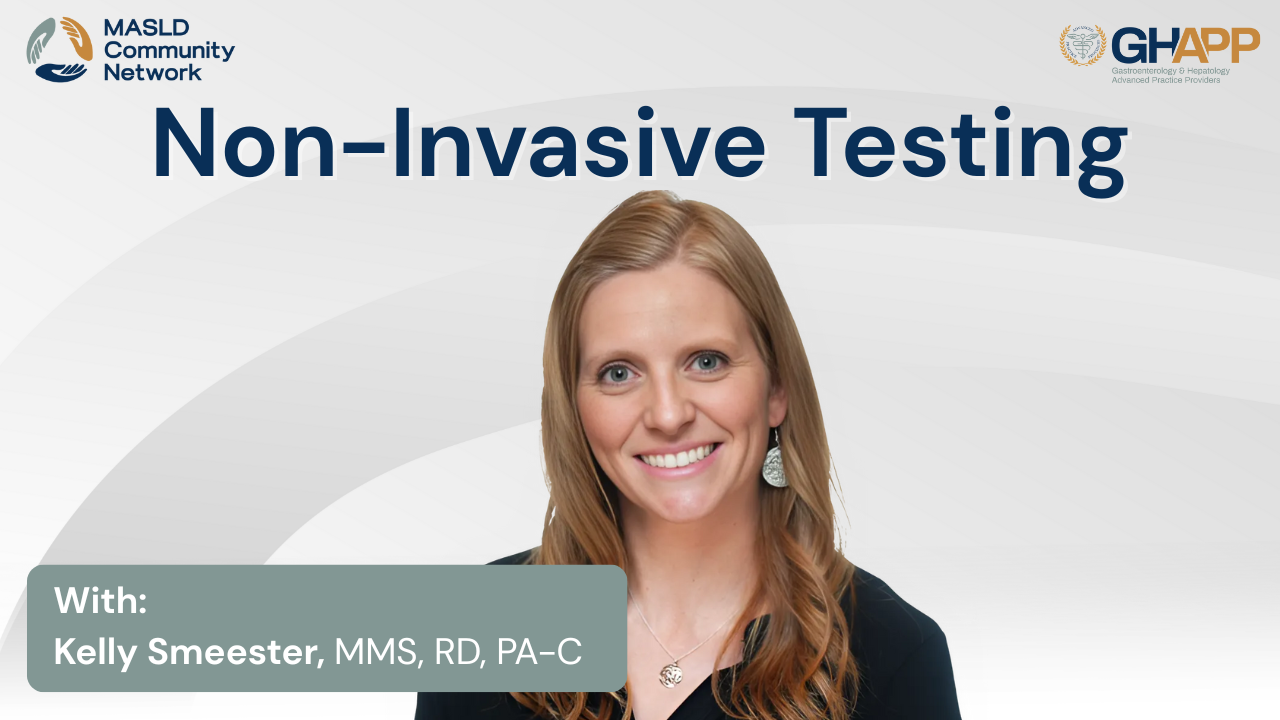
Non-Invasive Testing With Kelly Smeester

Join Kelly Smeester, MMS, RD, PA-C, from South Denver Gastroenterology, for an in-depth discussion on the latest tools and strategies in non-invasive liver disease assessment, presented through the GHAPP MASLD Community Network. This evidence-based session walks viewers through a case study of a patient with Metabolic Dysfunction-Associated Steatotic Liver Disease (MASLD) and explores the full range of non-invasive testing modalities used to evaluate liver fat, stiffness, and fibrosis risk. Kelly breaks down the utility of key tests including FIB-4, ELF Score, FibroScan (VCTE), and MR Elastography, and compares their accuracy, accessibility, limitations, and clinical value. Learn how to interpret biomarkers such as CAP (Controlled Attenuation Parameter) and kPa (Kilopascals), how to navigate indeterminate FIB-4 results, and when to escalate to more advanced imaging like MRE. The session also provides insights into combined scoring models (FAST, MAST, MEFIB), real-world use cases, and how comorbidities and patient-specific factors (BMI, ALT, bilirubin, ascites) can impact test reliability. Whether you're managing early-stage fatty liver disease or advanced fibrosis, this session provides essential knowledge to guide accurate diagnosis, risk stratification, and long-term monitoring without a liver biopsy.
Watch Now
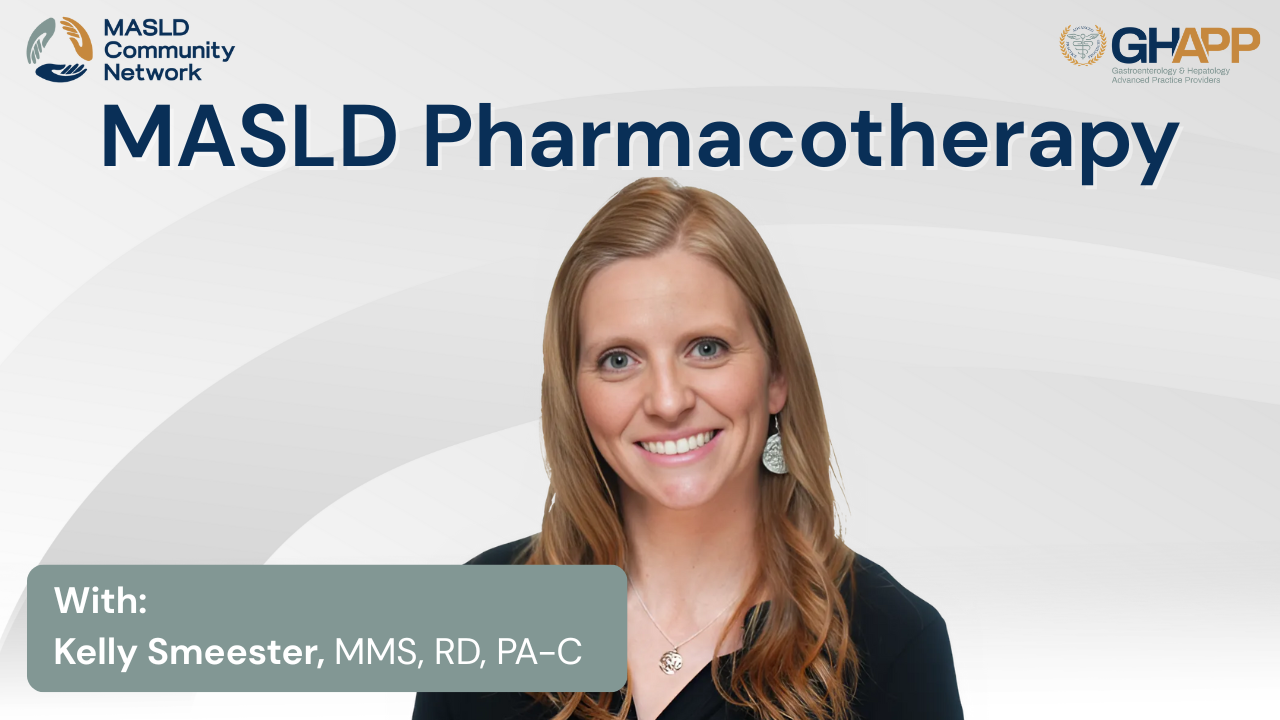
MASLD Pharmacotherapy With Kelly Smeester

Join Kelly Smeester, MMS, RD, PA-C, from South Denver Gastroenterology for an in-depth pharmacologic review of current and emerging treatment options for Metabolic Dysfunction-Associated Steatotic Liver Disease (MASLD) and MASH (Metabolic Dysfunction-Associated Steatohepatitis), as part of the GHAPP MASLD Community Network. This session outlines a comprehensive treatment strategy focused on three key goals: promoting weight loss, reducing cardiovascular risk, and targeting liver-specific interventions. Kelly highlights lifestyle and pharmacologic interventions including GLP-1 receptor agonists, GIP/GLP-1 dual agonists, and bariatric surgery, while exploring evidence-based guidance for treating comorbidities like type 2 diabetes, hypertension, and dyslipidemia. She dives into the latest data on vitamin E, pioglitazone, and the newly FDA-approved Resmetirom (Rezdiffra)—a thyroid hormone receptor beta agonist indicated for adults with non-cirrhotic NASH and F2–F3 fibrosis. Learn about the results from pivotal clinical trials like ESSENCE, PIVENS, and MAESTRO-NASH, the importance of NAFLD activity scoring, as well as dosing strategies, adverse effects, and drug interactions to consider when using Resmetirom. The session also explores practical monitoring approaches including FibroScan, MRI-PDFF, and ELF scores, with an outlook on evolving treatment duration and insurance coverage considerations. Whether you're a hepatology provider or part of a multidisciplinary care team, this presentation offers critical insights to optimize MASH treatment pathways today and in the future.
Watch Now

Monitoring for MASLD in Type 2 Diabetes

In this episode, Kelly Smeester, PA-C from South Denver Gastroenterology, explores the critical intersection of type 2 diabetes and metabolic dysfunction-associated steatotic liver disease (MASLD). Drawing from her background in both hepatology and endocrinology, Kelly offers practical, evidence-based strategies for non-invasive monitoring of liver fibrosis in patients with diabetes who may initially appear low risk. She highlights the utility of tools like FIB-4, ELF score, FibroScan, and MR elastography, while emphasizing the limitations of relying solely on liver function tests (LFTs). Kelly recommends annual FIB-4 screening—easily calculated with existing lab values—and discusses when to escalate to more advanced diagnostics. She also shares how advanced practice providers (APPs) can seamlessly integrate MASH education, lifestyle counseling, and routine screening into the diabetes care workflow, supporting early intervention and long-term liver health. This episode is a must-listen for clinicians looking to optimize care for patients at risk of silent liver disease progression in the setting of metabolic co-morbidities.
Watch Now
FAQ's

APP Insight: Misconceptions About Liver Health

In this video, Kelly Smeester, PA-C from South Denver Gastroenterology, addresses some of the most common and harmful misconceptions about liver health. One major myth she tackles is the belief that liver disease only affects those who drink excessive amounts of alcohol. Kelly explains that liver disease has many causes—including autoimmune conditions, viral infections, and metabolic dysfunction—meaning even individuals who don’t drink at all may still be at risk. She emphasizes the dangers of relying on unregulated “liver detox” supplements, clarifying that the liver is a natural detox organ and doesn’t require external cleanses, which may actually do more harm than good. Kelly also highlights how liver disease can be entirely asymptomatic, particularly in patients with conditions like type 2 diabetes, obesity, hypertension, and high cholesterol. Finally, she reinforces that cirrhosis is not solely alcohol-related and can result from steatotic liver disease, making regular liver evaluations and screenings crucial for early detection and management. This video is an essential resource for patients and providers aiming to better understand liver health beyond outdated myths.
Watch Now






